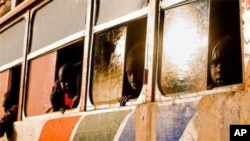The UN Refugee Agency (UNHCR) says the number of South Sudanese who are leaving the north and returning to the south ahead of the referendum has doubled since mid-December and now stands at 120,000.
Many of the returnees say they left the north in fear of the unknown and now look at the south as an opportunity to start a new life in their homeland.
The UNHCR has a presence in South Sudan to support the returnees and the existing community. It has also set up soup kitchens along the route and provides safe-havens for women, children and the elderly. But the agency says the huge influx of people into urban areas is putting a significant strain on cities.
Sybella Wilkes is spokesperson for the UNHCR in Geneva, Switzerland,
“In many senses this is actually, obviously, a very optimistic movement that we are seeing. Having said that, there are tens of thousands of people on the road. A significant number of them are coming from Khartoum and they are choosing to settle in the urban areas.
This is putting considerable strain on an already fragile infrastructure, says Wilkes. “So it’s clear that southern Sudan is going to need a lot of help to welcome and to integrate tens of thousands of people.”
The additional pressure put on these urban areas has prompted the UNHCR to focus attention on the urban returns.
“I’ve just heard from a colleague who is in the capital of the Upper Nile region, Malakal. He said he is seeing scenes of people bringing everything they own – literally – sofas, chairs, tables – everything. In Malakal, the state authorities are giving them some support with re-integration – some basic items, foods, as well as some transport to get back to their home villages.”
Wilkes says there are some groups of particular concern.
“We have come across a number of unaccompanied and separated children. There are some women who face some issues and also some elderly and disabled who need that extra helping hand.”
Wilkes said there is also concern over the significant number of southern Sudanese, some 1.5-2.0 million who prefer to remain in the north, and what their status will be after the referendum.
“We are working with government officials to try and resolve this because there is obviously lots of concern amongst the southern Sudanese community living in the north.”
Wilkes says most of the returnees to southern Sudan from the North are being registered as citizens of South Sudan.




